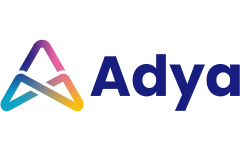Enables ecommerce businesses to build and launch an app in one day
Helps customers build reliable, scalable apps with Google Kubernetes Engine
Supports senior engineers to build faster with Gemini Code Assist
Enables fast analytics and clear insights of customer apps
Provides access to self-service apps through Google Cloud Marketplace
Adya democratizes the ecommerce space for smaller Indian retailers through its core platforms—ATMA, Adi, and Vanij—with the scalability of Google Kubernetes Engine and LLM capabilities of Gemini for Google Cloud.
Adya democratizes the ecommerce space for smaller Indian retailers through its core platforms—ATMA, Adi, and Vanij—with the scalability of Google Kubernetes Engine and LLM capabilities of Gemini for Google Cloud.
Removing barriers to ecommerce success for small retailers

India has experienced an ecommerce boom in recent years, with the market reported to reach $325 billion by 2030. To increase ecommerce penetration across India, the Indian Government formed the Open Network for Digital Commerce (ONDC) to make ecommerce more accessible to sellers from small towns and rural areas. Against this backdrop, technology startup Adya was founded in May 2023, with its main product ATMA designed to support vendors that want to join the ONDC.
“We’re trying to create something that will improve people’s lives,” says Shayak Mazumder, Founder, CEO, and CTO at Adya. Inspired by this mission, the company's name and core product draw on concepts from Hindu philosophy, which is seen as representing the fundamental forces of the universe.
We would have struggled to launch without the support of Google Cloud customer engineers. They have worked extensively with us on the architecture, ideation, and taking the product to market.
Shayak Mazumder
Founder, CEO, and CTO, Adya
"Adya" means "origin" in Sanskrit, reflecting the company’s focus on beginnings and potential. Its main product, "ATMA," is a Sanskrit word meaning “the soul” which emphasizes Adya’s commitment to empower the very soul of the businesses using its platform.
ATMA is a technology marketplace that democratizes the ecommerce space in India by leveling the field for businesses to compete against established incumbents. Through the ATMA platform, businesses can launch an app on the ONDC protocol with just a few clicks instead of spending months trying to build an app from scratch.
As a fast-growing startup, Adya chose Google Cloud for its flexibility, scalability, and ongoing customer support. “We would have struggled to launch without the support of Google Cloud customer engineers,” Mazumder says. “They have worked extensively with us on the architecture, ideation, and taking the product to market.”
Importantly, a key factor for collaborating with Google Cloud lies in its generative AI capabilities, with Gemini for Google Cloud, An AI-powered assistant that can be seamlessly integrated with Google Cloud and Google Workspace. Alongside its multimodal capabilities, Adya was able to seamlessly develop its platform, equipped with the latest AI technologies to assist app development.
Speeding up app development and scalability without downtime

As more customers began to launch their applications with ATMA, Adya started to face development roadblocks. The DevOps team was building applications with standard cloud practices, which meant it could take two to six months to launch an app.
“We expressed this problem to the Google Cloud team, and they provided us with a solution to automate the entire scripting process,” Mazumder says. Using Terraform on Google Cloud, ATMA automates the script and launches an app in just one hour instead of months. It also standardizes the product lifecycle and codebase for better reliability and security.
As a fully self-service platform, Adya relies on Google Kubernetes Engine (GKE) to launch a scalable architecture. This allows customers to launch their apps and scale at any time, while keeping costs low. But as Adya's user base grows, so does the amount of data flowing through the platform. This high volume of data can quickly overload the system, but with GKE, Adya can pull together tools like Kafka, Redis, and Elastic search to manage queuing, streaming, and caching at all times.
“With Google Kubernetes Engine, users don’t need to know the complexities behind the architecture we’ve built. With a few clicks on our platform, their application will launch and scale by itself,” Mazumder says. “Regardless of the traffic volume, GKE won’t break, which is what makes it such a brilliant operating system.”
Adya also uses multiple analytics and observation tools, including BigQuery and Looker Studio, to quickly analyze and visualize data in comprehensive dashboards, giving users better visibility across the Adya platform.
Supporting LLM model development with Gemini for Google Cloud
Apart from ATMA, Adya also developed a custom large language model (LLM), ADI (Adya Deep Intelligence), and an agent orchestration platform called Vanij. While ADI consists of multiple proprietary models, the Adya team collaborates with Gemini for Google Cloud to create various use cases around it. “We recently created a plugin that will help people perform voice searches on our applications, and that voice search leverages Gemini,” Mazumder explains.
By layering ADI and Gemini, Adya is working on enterprise search, training the LLM so users can simply ask a question and get a generated response.
Gemini Code Assist has saved developers a lot of time in building end-to-end applications. It is hands down the best solution on the market.
Shayak Mazumder
Founder, CEO, and CTO, Adya
“Gemini is a far bigger model that’s built for a broad purpose, while ADI is retail-specific. By putting these two platforms together, we’re able to create a product that’s both unique, has far lower cost for the end user (about 10-20x less), lower latency and lower hallucinations and higher efficiency,” Mazumder says.
Adya is also working to develop its enterprise search capabilities with Gemini. “Enterprise search requires the platform to ingest a ton of documents, learn them, and then be able to break them up into chunks so that when a user requests for a particular piece of information, it can deliver the answer immediately,” shares Mazumder, adding that this is similar with code bases, where it is currently working to co-create with Gemini.
Meanwhile, the DevOps team regularly uses Gemini Code Assist to save time, particularly for end users looking to build new applications. “Gemini Code Assist has saved developers a lot of time in building end-to-end applications,” Mazumder says.”It is hands down the best solution on the market.”
From customer to collaborator

From the day Adya launched, Mazumder knew the company would use Google Workspace for its day-to-day operations because of its ease of use, security, and accessibility. And with the rest of Adya’s operations running on Google Cloud, adopting workspace allowed for seamless interoperability and collaboration at scale.
Hard work and collaboration have paid off. Having worked closely with Google Cloud to build its products since inception, Adya now has six solutions on the Google Cloud Marketplace. These solutions include an inventory seller app, marketplace seller app, finance and reconciliation management app, logistics app, issues and grievances management app, and a buyer app.
One year since launch, Adya has big plans for the near future. “My biggest focus now is to combine Vanij and ATMA, and launch entirely on Google Cloud,” Mazumder says. “I believe we will witness even bigger growth and scalability as more users come on board. By continuing to work closely with the team at Google Cloud, we will go far.”
My biggest focus now is to combine Vanij and ATMA, and launch entirely on Google Cloud. I believe we will witness even bigger growth and scalability as more users come on board. By continuing to work closely with the team at Google Cloud, we will go far.
Shayak Mazumder
Founder, CEO, and CTO, Adya
Adya is revolutionizing the digital commerce landscape as a trusted Technology Solution Provider (TSP) within the Open Network for Digital Commerce (ONDC) ecosystem. Its mission is to enable businesses of all sizes to thrive in the digital era by offering a comprehensive suite of tools, applications, and intelligent solutions that seamlessly integrate with ONDC.
Industry: Technology
Location: India
Products: Google Kubernetes Engine, AI Infrastructure, BigQuery, Looker Studio, Operations, Speech-to-Text, Text-to-Speech, Vertex AI, Gemini for Google Cloud, Gemini Code Assist, Google Workspace












